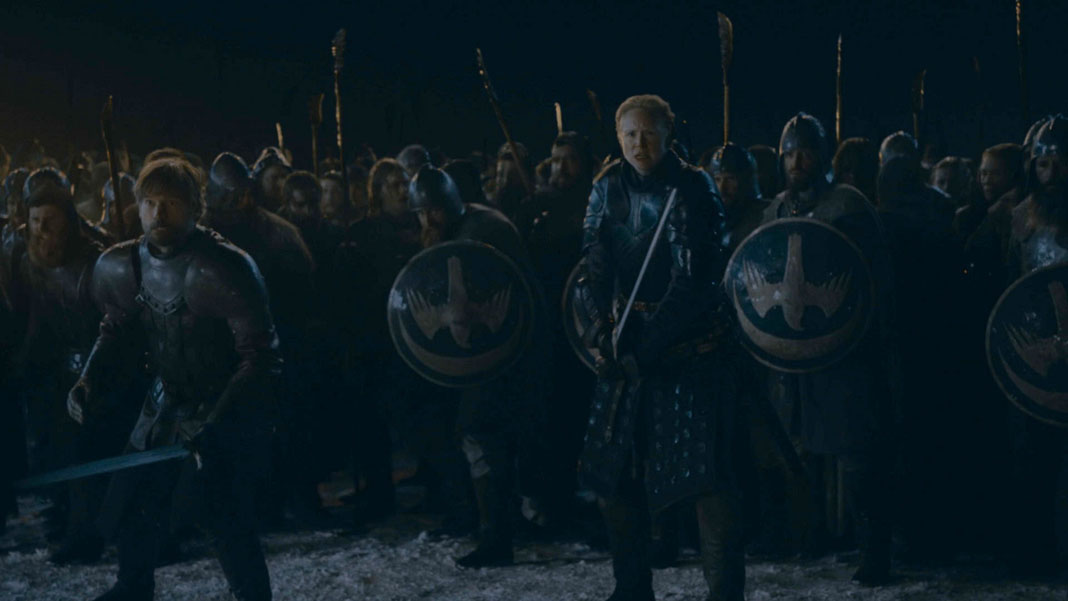Can We Talk About the Darkness in Game of Thrones?
Before I begin, let me be very clear. I loved “The Long Night” episode of Game of Thrones. Let me also be clear about the fact that there are spoilers in here, so if you haven’t watched the third episode of Season 8, turn back now.
Some idiot spoiled something for me with a title while scrolling through my iPhone and I don’t want to do that to you.

Still here? Okay. As I said, I loved the episode. I loved how little dialogue there was. I loved the sense of fear that was built up. I loved how Melisandre failed with her attempts to help, despite how pretty they looked, though I do wonder what happens to the whole “Prince That Was Promised” thing now that she’s a crumpled heap in the snow. I was scared in the crypts with Sansa and Tyrion. I was panicking during the dragon fight. I cried and yelled when Arya killed the Night King because she’s been my favorite since the very first episode. I have Needle on my wall, and now I’m going to have to get her other weapons.
The thing that bothered me was the darkness…
I understand narratively that feeling of that sense of dread that comes with the absence of light. Waiting for monsters to come out of the dark is terrifying. It makes sense from a storytelling perspective. The darkness in the room where Arya was playing out a horror movie was part of the story, though we could actually see her and what was moving around the room with her. I’m talking about the battle scenes.
Fast-moving battle scenes can be frustrating, but it’s so much worse when you can’t see a damn thing on the screen. Isn’t the point of showing the battle to show the battle? This is about the plot, right? Then, shouldn’t I, as the viewer, be able to view the scene?
This week’s Game of Thrones episode kept me removed from what was going on. I couldn’t feel for Jamie or Brienne because I couldn’t tell if they were the ones fighting. Considering the sentiment the show’s built up for them over eight seasons, and particularly the last episode, I wanted to know when they were fighting. I wanted to see them in fear for their lives, not spend half an hour trying to figure out if that head of hair was Jamie’s or if that silhouette was Brienne’s. I couldn’t tell where Sam ended up or who was where. Where was Grey Worm through most of the battle? I think I saw him… maybe I should have adjusted the brightness on my TV?
Darkness in the beginning, as we were waiting for the battle to start, or when the flaming swords of the Dothraki go out, makes narrative sense. The rest of it made me think they were obscuring the battle, so it was cheaper to make. Look, no one forced you to do a battle scene that long. I’m sure the effects were very expensive, but if you worked that hard on them, shouldn’t I be able to see them instead of giving myself a splitting headache, trying to make out what the hell was happening?
Yes, I know that in a real battle, that’s probably how it feels. The darkness makes it more frightening, and you’re wishing for more light. My point, however, is that I’m not in a real battle. I’m a viewer, and I would like to view the episode. Television is a visual medium. I want to see what I’m watching. By obscuring everything, you took away so much of why I watch. I’m there for the characters I’ve come to care about, and I could barely see when one of them died. I had to look up the list of the dead because I couldn’t see it happen. It’s frustrating. It’s a frustration that has been building for a long time. I’m paying for HBO, right? Should I need to read ten articles to figure out what I just watched?
I love Game of Thrones. Arya is the Queen of everything and my prince that was promised (and at least half of Twitter last night). I’m still looking forward to what’s coming next week. The thing is, HBO isn’t the only one guilty of this. I’ve been hating the trend since it started back in an early Oddworld game. (At least, that’s the first time I noticed it.) You know that whole thing about watching television? I’d like to do that. There is a reason night scenes are usually lit. It might not be realistic, but I’m not trying to sleep. I want to see what the heck is happening.
